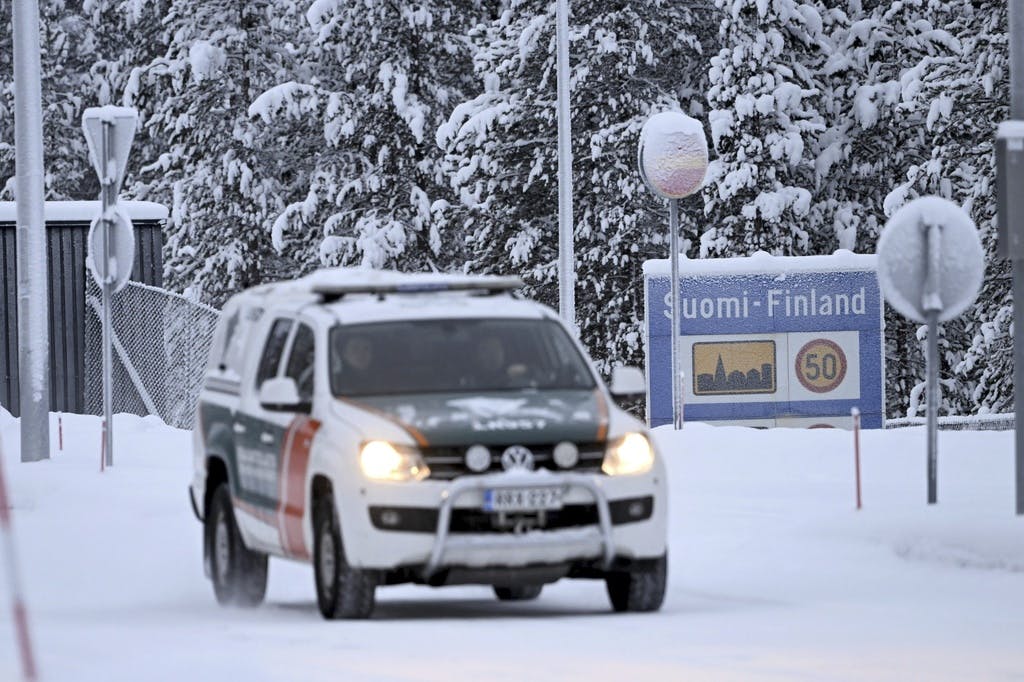Flooded by Asylum Seekers From Russia, Finland Shuts its Eastern Border for Two Weeks
Moscow ramps up pressure on Finland as under-the-radar retaliation for the Nordic country’s recent entry into NATO.

The Russians are coming to Finland — or rather, people who somehow found themselves inside the Russian Federation but want to get out — but they will find the long border with the Nordic country is slammed shut. The entire Finnish frontier with Russia will essentially be sealed for the next two weeks in a bid to halt an unusually large flow of asylum seekers to Finland.
The 830-mile land border, which traverses a sparsely populated area between Russia and Finland mostly covered with taiga forests, will be closed until December 13.
Finland last week shut all but one of its border posts with Russia, keeping open only the northernmost crossing in the Arctic. That post will now be closing too, the government said on Tuesday.
Why the sudden Russian rush to the Finnish border? Is it a sudden collective disaffection with President Putin’s policies? Nyet. The Finnish border guard said that so far this month 900 asylum seekers from countries including Somalia, Yemen, Iraq, and Syria have arrived in Finland from Russia.
Sometimes they arrive at the border by bicycle, despite the icy conditions that prevail in those northern latitudes for much of the year.
The Finnish government and its allies say it’s all part of an orchestrated move by Moscow. At a press conference on Monday, Prime Minister Petteri Orpo said bluntly, “This is Russia’s influence operation and we do not accept it.”
Seconding that was the Finnish interior minister, Mari Rantanen, who declared that “Finland is the target of a Russian hybrid operation”. She described the move to seal the border as “a matter of national security.”
The Finnish government claims that Moscow is pushing asylum seekers to the border as revenge for Finland’s cooperation with America, particularly since the Russian invasion of Ukraine last year. In April, Finland became the 31st member of the North Atlantic Treaty Organization.
At Brussels, NATO secretary general Jens Stoltenberg also called out Moscow’s role in heating up the frontier. “I think this is another example of how Russia is using many different tools to put pressure on neighbors,” he said, adding “we have seen them using energy and cyberattacks, we have seen them using different kinds of clandestine operations to try to undermine our democracies.”
Mr. Orpo said that Helsinki had intelligence information on Russian authorities assisting the asylum seekers and that despite Finnish border closures, there were still more people in Russia heading towards Finland.
On Monday, only three asylum seekers arrived in Finland through the remote Raja-Jooseppi station, the last open border post, and on Tuesday there were no entrants.
The border station will remain open on Wednesday before closing until 13 December, the government said.
Meanwhile, Finland’s ombudsman for non-discrimination last week said that Helsinki’s actions might be jeopardizing the right to seek asylum. But on Tuesday Finnish officials said that asylum can still be sought by travelers arriving by boat and by air.
In any event, the land border is no cinch to patrol given its length. That is why, according to Finnish press reports, last week the Finnish Border Guard asked Frontex, the EU’s border and coast guard agency, for auxiliary support. In response to the call the agency is dispatching 50 officers to Finland along with portable thermal cameras and patrol vehicles, but border patrol posts will still be managed by the Finns themselves.
Frontex officials will be stationed at all border patrol stations on the eastern Finnish border: in the southeast as well as the regions of North Karelia, Kainuusi, and Lapland.
In the meantime, those lonely travelers who are actually contemplating visiting Russia these days could be in for an unpleasant surprise upon arrival. The Russian news agency Tass reported on Wednesday that the country’s interior ministry has proposed a law that would require foreigners to sign an “agreement of loyalty.”
This is seen by Moscow as a way to prevent any foreign national from “hindering the activities of public authorities of the Russian Federation [or] discrediting in any form the foreign and domestic state policy of the Russian Federation, public authorities, and their officials.”
The draft law will soon be sent to the State Duma, or lower house of Russia’s federal assembly, where it will likely be rubber-stamped into law.

